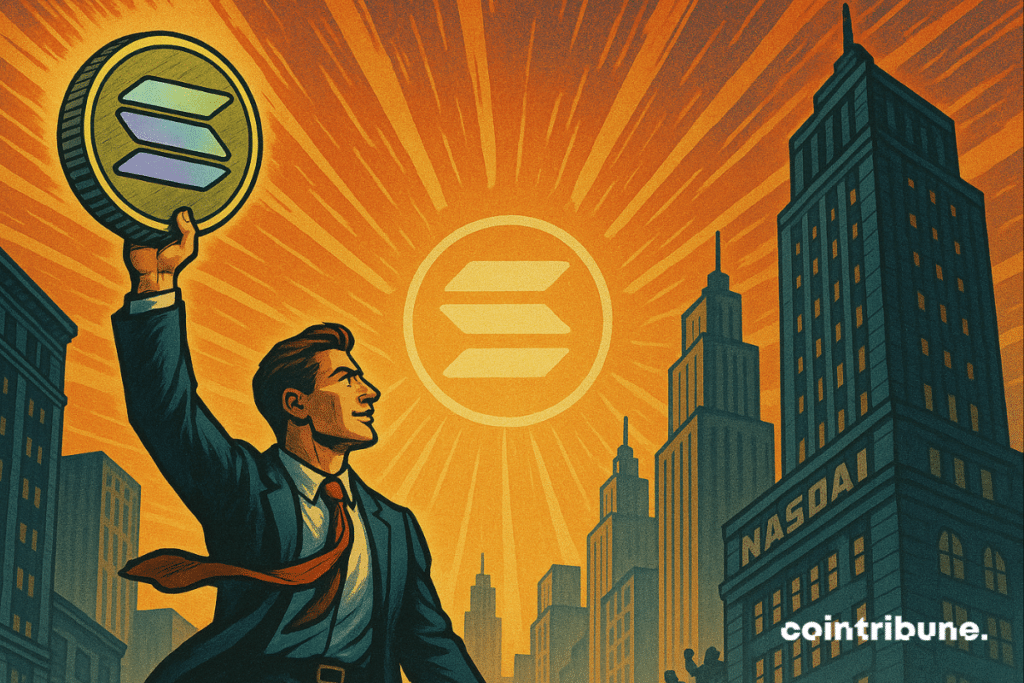Solana’s Alpenglow Upgrade: Racing Toward Nasdaq Speed in Crypto’s High-Stakes Tech Arms Race
Solana fires another shot in the blockchain speed wars—its Alpenglow upgrade targets sub-second finality, putting traditional finance's creaky infrastructure on notice.
| The Need for Speed |
While Wall Street still settles trades in T+1 dinosaur time, Solana's latest upgrade slashes latency like a hot knife through decentralized butter. The chain that brought you 400ms block times isn't satisfied playing second fiddle to centralized exchanges.
| Under the Hood |
Early testnets show Alpenglow's pipelined transaction processing could outpace Nasdaq's matching engine—if the network holds under load. Because what's the point of 100k TPS if validators crumble like a meme coin's 'fundamental valuation'?
| The Bigger Game |
This isn't just about bragging rights. Institutional players demand institutional-grade speed, and Solana's betting its entire stack that you can have decentralization without sacrificing the feeless, sub-second execution hedge funds take for granted.
As the upgrade rolls toward mainnet, one thing's clear: in crypto's relentless pursuit of zero-latency alpha, even millisecond advantages get arbitraged into oblivion. Welcome to the era where 'blockchain scaling' means beating traditional finance at its own game—before the suits finish their morning Starbucks.

In Brief
- Solana plans to replace Proof-of-History and TowerBFT with a new consensus model called Alpenglow.
- The upgrade aims to cut delays, boost security, and deliver faster and more reliable confirmations.
- Solana recently hit 35M daily transactions, surpassing volumes of several major global exchanges.
Fixing Solana’s Bottlenecks with Faster Finality
Solana’s team explained that TowerBFT has created performance challenges. Under the existing system, finalizing blocks can take longer than users expect, leading to noticeable transaction delays.
More importantly, TowerBFT does not provide formal safety assurances, leaving the network without clear mathematical guarantees that two conflicting blocks cannot be confirmed in rare circumstances.
The new system promises to resolve both issues. Alpenglow has been built on recent research in distributed consensus, giving the blockchain quicker finality times, improved resilience, and stronger security foundations. It also reduces complexity while maintaining efficiency, a balance developers have been aiming for as the network expands.
Votor is the engine driving Alpenglow, replacing TowerBFT with direct voting. Validators can finalize blocks in one or two rounds, cutting confirmation time from roughly 12.8 seconds to as little as 100 milliseconds. This gives solana near-instant speed, closer to the experience of regular web applications.
Next Steps and Governance Roadmap
Alongside Votor, Alpenglow will introduce another protocol known as Rotor. While Votor is focused on voting and finality, Rotor will manage the rapid spread of data across the network. Rotor is not part of the first rollout but is planned as a later step once Votor is live.
Key details of the upgrade include:
- Alpenglow is built for resilience, tolerating up to 20% adversarial validators and another 20% going offline.
- The governance review begins with two weeks of community discussion during epochs 833 through 838.
- Epoch 839 will be used for stake verification before the voting phase begins.
- Voting is scheduled across epochs 840 to 842 and requires two-thirds support to move forward.
- If passed, Alpenglow will replace TowerBFT and become Solana’s new standard for confirming transactions.
Record Transactions Put Solana Ahead of Major Exchanges
The upgrade comes as Solana recently hit a record 35 million transactions in a single day, topping the combined activity of leading stock exchanges in Tokyo, India, and Hong Kong.
Yet when compared with Nasdaq in the United States, the picture shifts. America’s tech-heavy exchange runs at about 2,290 trades each second, with more than $362 billion moving daily. Solana, by comparison, processes just over 400 trades a second and has a daily value of $9.61 billion. The gap shows how much ground remains, even as the blockchain edges closer to traditional finance in scale.
SOL Price Slips but DEX Activity Holds Strong
In terms of market performance, Solana’s token, SOL, has seen a recent decline. It fell by more than 2% over the past 24 hours and is trading around $184.
SOLUSD chart by TradingViewHowever, activity on decentralized exchanges built on Solana remains strong. In July, those platforms processed $124.2 billion in trading volume. That figure extended Solana’s lead over Ethereum, which saw $87.1 billion over the same period. It also marked the tenth consecutive month in which Solana maintained a higher DEX volume than its main rival. With Alpenglow on the horizon, Solana’s progress reflects its efforts to scale and compete at higher levels of finance and tech.
Maximize your Cointribune experience with our "Read to Earn" program! For every article you read, earn points and access exclusive rewards. Sign up now and start earning benefits.

